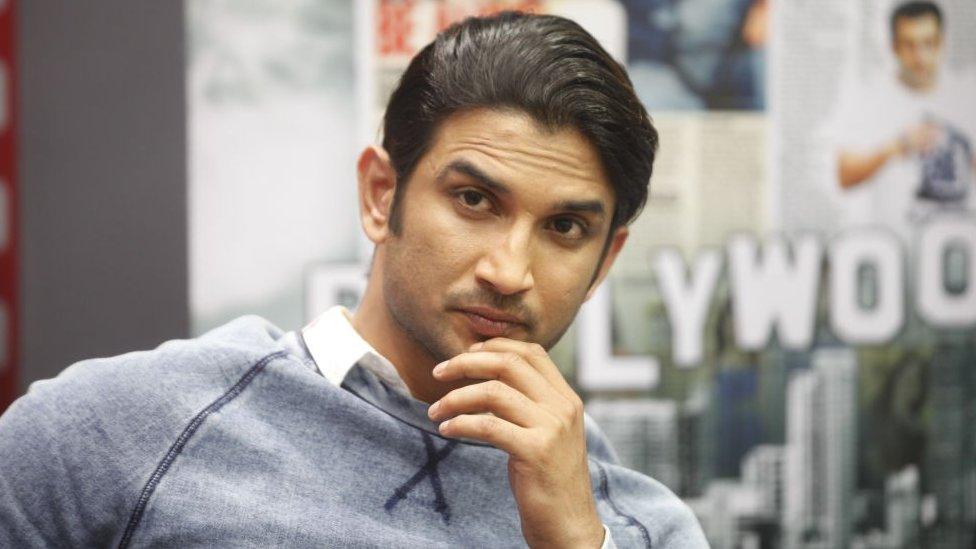Rhea Chakraborty: Why is Indian TV obsessed with Sushant Singh Rajput's death?
- Published
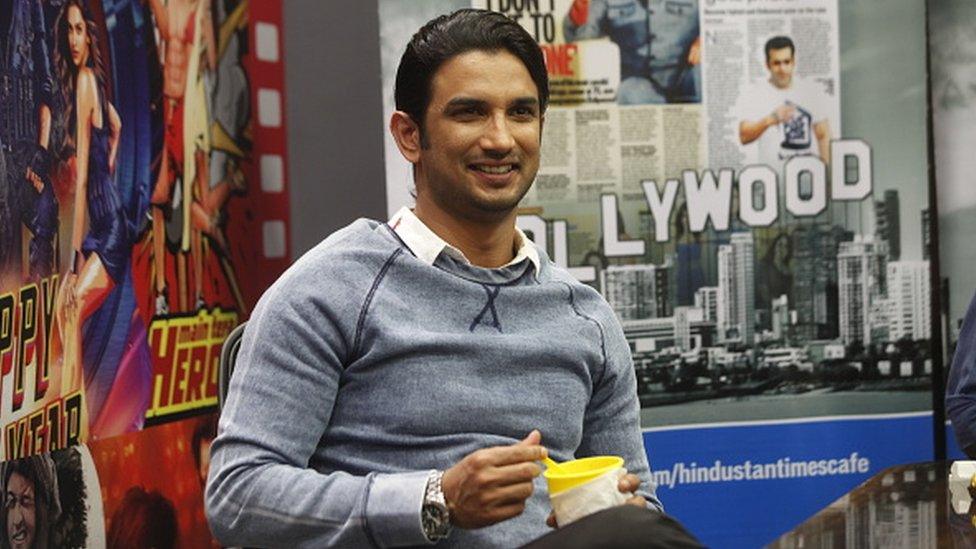
Sushant Singh Rajput took his own life in June, police have said
The sudden death of a young celebrity would be big news anywhere.
But the frenzied coverage of Bollywood actor Sushant Singh Rajput's death and vilification of his actor-girlfriend Rhea Chakraborty has dominated prime-time in India, leading many to ask whether the story is distracting from more important issues at a time of national crisis.
The media obsession began in June when Rajput was found dead in his apartment. Mumbai police said the 34-year-old actor had taken his own life, and reports in the press suggested he had been dealing with mental health issues.
But the case is now being investigated by federal police after Rajput's father accused Chakraborty of abetment of suicide, stealing his son's money, overdosing him on medication, and even murdering him - unsubstantiated allegations that she has denied.
On Tuesday, Chakraborty was arrested by India's narcotics control authority for allegedly buying cannabis for Rajput. She denies all the allegations against her.
A trial by media has followed the wild accusations, with some of India's most popular television hosts declaring Chakraborty guilty already.
"Nothing can rival a reality show - everyone is glued to their TV sets," says Shailaja Bajpai, media editor of news website The Print.

Rhea Chakraborty and Sushant Singh Rajput were in a relationship
The media circus around the case comes at a time when India faces a host of critical issues. Last Monday, the government released alarming GDP figures. In the three months to the end of June, the economy had contracted by 23.9% - the worst slump since 1996 when the country started releasing quarterly data.
Much of the downturn has been caused by the coronavirus pandemic sweeping the country. India now has the second-largest number of confirmed cases in the world after the US.
Tensions on the disputed border with China are also worse than at any time since the 1960s.
But most television news channels have devoted little time to these issues. When a panellist on one channel gamely sought to discuss the economy, he was slapped down.
"I want to put on record my deep disgust on a day GDP has contracted 23.9%..." he began.
The host cut him short: "You don't need to be part of this debate if you find it so disgusting. Don't waste our time, your time, nation's time, viewers' time and my time," he shouted.
"Go, go," he told him before advising him to read newspapers the next day if he wanted to know about GDP.
There have been similarly theatrical performances on other channels too, with prime-time hosts telling viewers repeatedly that the star's death was the "biggest story" of our times. On Tuesday, after Chakraborty's arrest, one presenter boasted on air that their channel had spent 2,000 hours on the story.
So why is the death of Rajput getting so much attention, and Chakraborty being so vilified?
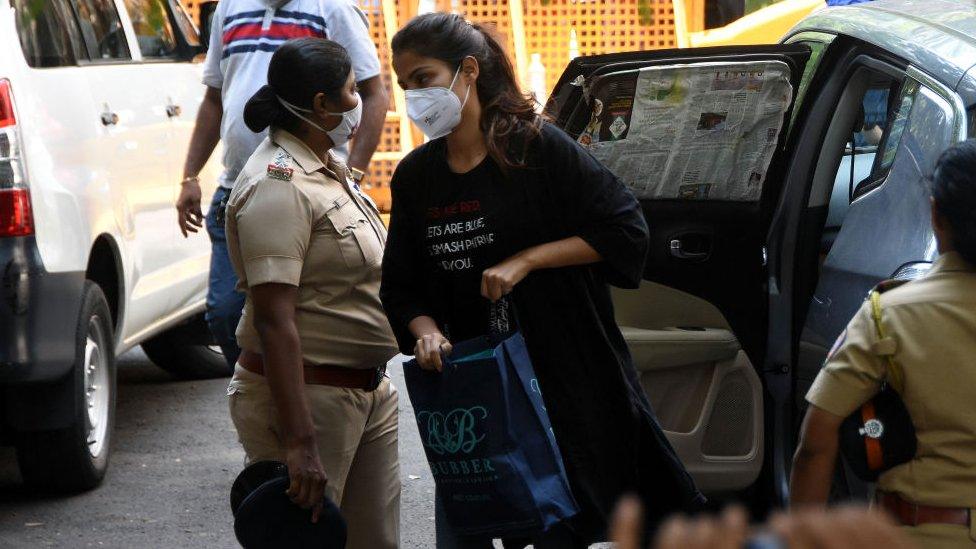
There has been extraordinary interest in Rhea Chakraborty's life
The most obvious reason is politics, say analysts, pointing out that the channels that have given most attention to the story are those that are sympathetic to Prime Minister Narendra Modi and his Bharatiya Janata Party (BJP)
"Elections are due later in the year in Bihar - Rajput's home state - and politicians here are seeking votes in the actor's name," says Amarnath Tewary, a senior journalist in the state capital, Patna.
Chief Minister Nitish Kumar invoked Rajput's name at his first virtual election rally on Monday and his alliance partner BJP has been distributing car stickers, masks and pamphlets with the actor's smiling face, Mr Tewary says, adding that "once the elections are over, no-one in Bihar will talk about Rajput".
The story may have a longer shelf life in the western state of Maharashtra - capital, Mumbai - where an ugly spat has broken out between the BJP and its former ally-turned-bitter rival Shiv Sena, which governs the state.
The BJP has accused a Shiv Sena minister of involvement in the case - a charge the minister strongly denies, reports senior Mumbai journalist Abhay Deshpande. "The BJP is trying to expedite the fall of the Shiv Sena government. But first, they want to discredit Sena so that it doesn't win people's sympathy. So, they are letting the story roll."
But, as The Print's Ms Bajpai points out, the story could well be a distraction that serves the government well.
"You have a story that has juicy crime, Bollywood, cinema and current affairs. You place a nice-looking young woman at the centre of it and it's tailor-made to divert attention and distract people from the real issues," Ms Bajpai says.
"The government is happy because no-one is questioning them about the economy, the GDP, the job losses and the rising coronavirus numbers."
Also, she says, it makes commercial sense for TV channels because it has improved their ratings, brought them massive audiences and advertising revenues.
"The ratings have constantly gone up because the voyeuristic audiences are lapping up every twist and turn in the story. So the channels stay with it. But we also have to confront the elephant in the room - what does it say about our society?"
It says that our voyeurism may well be partly responsible for the demonisation of Rhea Chakraborty.
- Published28 August 2020

- Published8 September 2020
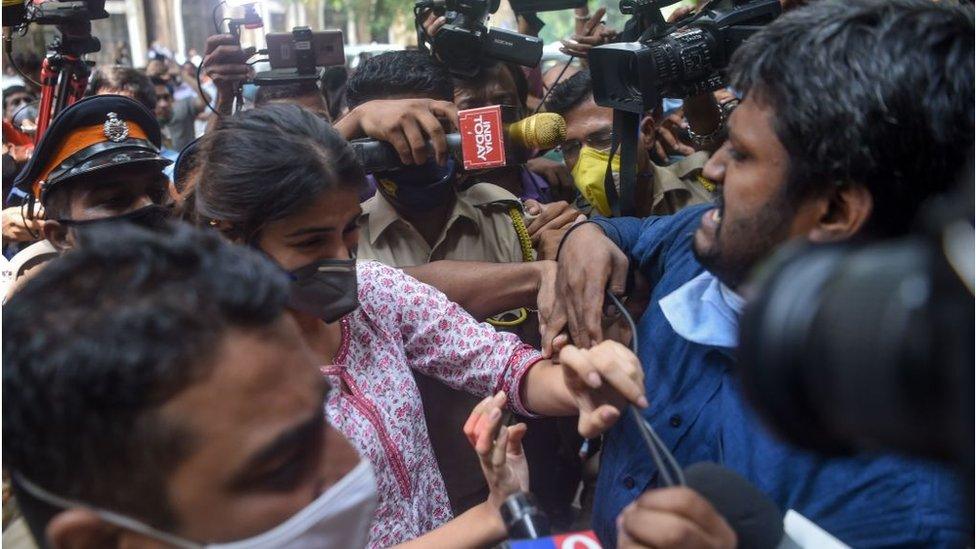
- Published8 August 2020
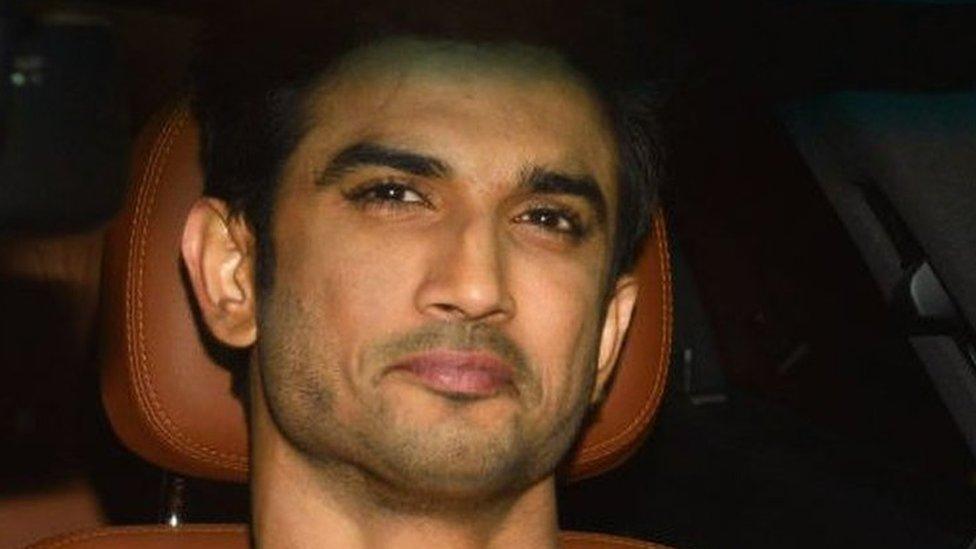
- Published15 June 2020
